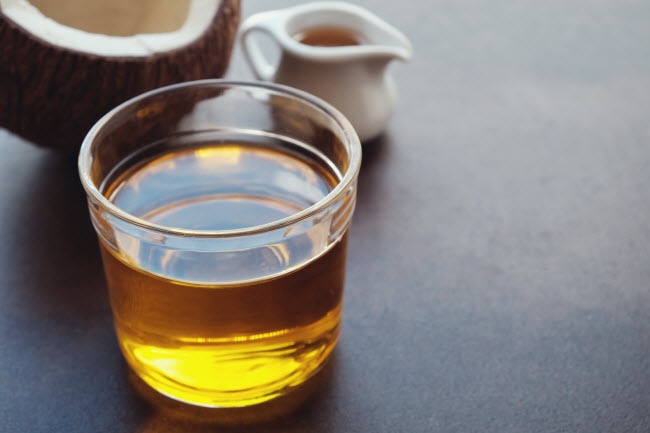MCT oil is a popular supplement that has attracted widespread attention lately as eating patterns like the ketogenic diet and Bulletproof Diet have continued to gain traction.
It should come as no surprise that this heart-healthy fat is enjoying some well-deserved time in the limelight; in recent years, emerging research has found that MCT oil could crank up weight loss, support brain function, support healthy blood sugar levels and more.†
So what is MCT oil, how can it impact your health and how can you start to incorporate it into your daily diet? Let’s take a closer look.
What Is MCT Oil?
The term “MCT” stands for medium-chain triglycerides, which are a type of fatty acid that have been associated with a number of impressive health benefits. These fats are metabolized differently than other types of fat and are sent directly to the liver where they can be used as a quick source of energy in the body.
MCTs are found naturally in a variety of different sources, including coconut oil, palm oil, grass-fed butter, cheese and milk. However, they’re also available in the form of MCT oil, which offers a much more concentrated amount of MCTs in every serving.
MCT oil is produced by extracting and isolating the fatty acids from coconut oil or palm oil, resulting in a final product that is comprised almost entirely of either caprylic or capric acid. MCT oil supplements can be either consumed as is or used in recipes, dressings and condiments to help kick up your intake of this heart-healthy fat.
MCT Oil vs. Coconut Oil
Coconut oil is one of the most popular sources of medium-chain triglycerides around the world and has been studied extensively for its potential antioxidant, antibacterial and anti-inflammatory properties.† It’s also highly versatile, working as a multipurpose cooking oil, natural hair and skin product, household cleaner and more.
However, while MCT oil is made up entirely of medium-chain triglycerides, the MCT content of coconut oil typically hovers around 60 percent. Additionally, coconut oil contains all four types of medium-chain triglycerides and is highest in lauric acid but lower in other types found in MCT oil, such as caprylic and capric acid.
Because of the minute differences in the fatty acid composition of these two oils, each boasts a unique set of benefits when it comes to your health.† However, both can be a positive addition to a well-rounded diet when enjoyed in moderation.
5 Key MCT Oil Benefits
1. Supports heart health
Heart disease is a serious condition that is believed to account for an estimated 31.5 percent of deaths around the globe. (1) Simply switching up your diet is one of the most effective ways to reduce your risk of heart disease. One study published in the Journal of Nutrition found that combining MCT oil with phytosterols and flaxseed oil helped support healthy cholesterol levels.†(2)
2. Promotes weight loss
MCT oil is a great choice if you’re looking to slim down and shed a few extra pounds. In fact, studies show that increasing your intake of medium-chain triglycerides can help reduce appetite and intake, plus support fat-burning and metabolism in the process. (3, 4)
Not only that, but because MCTs are sent straight to the liver and metabolized very quickly, they’re less likely to be stored as fat compared to other types of triglycerides, meaning you can enjoy without as much worry about your waistline.†
3. Supports brain function
MCTs are a quick source of energy for the brain and have been shown to support several specific things related to brain health.† They can also be converted into ketones, which are able to cross the blood-brain barrier and supply the brain with an alternative source of energy when glucose stores get low.†
4. Fights bacteria
Several different types of medium-chain triglycerides have been shown to possess powerful antimicrobial properties, blocking the growth of harmful bacteria and yeast to help protect against illness.†
According to one in vitro study in the Journal of Medicinal Food, capric acid and caprylic acid, the two main types of medium-chain triglycerides found in MCT oil, were effective at inhibiting the growth of Clostridium difficile, a dangerous strain of bacteria.†(5)
5. Supports healthy blood sugar
Studies show that MCT oil offers benefits for supporting healthy blood sugar levels. In particular, one study conducted by the Obesity Research Center at Boston University School of Medicine found that supplementing with MCTs was able to support healthy weight loss and play a part in blood sugar control.† (6)
Meanwhile, another study in the journal Diabetes found that MCTs helped support healthy metabolism in people with diabetes, resulting in better blood sugar management.† (7)
How to Use MCT Oil
There are plenty of ways to enjoy the benefits that this superstar supplement has to offer. Because it’s virtually tasteless and odor-free, it can seamlessly fit into just about any meal or snack.
It works especially well when mixed into drinks, such as bulletproof coffee, smoothies and post-workout shakes. It can also be blended with dressings and keto-friendly condiments, or simply drizzled over pasta dishes and salads to bump up the fat content. Alternatively, try using MCT oil in place of coconut oil or other fats in your favorite baked goods or fat bombs.
Some people also prefer taking MCT oil as is, which can definitely be a quick and convenient option to get in your daily dose. Keep in mind, however, that a little goes a long way, so be sure to start with just half a teaspoon and slowly work your way up.
†These statements have not been approved by the Food and Dmct oil crug Administration. These products are not intended to diagnose, treat, cure or prevent disease.

